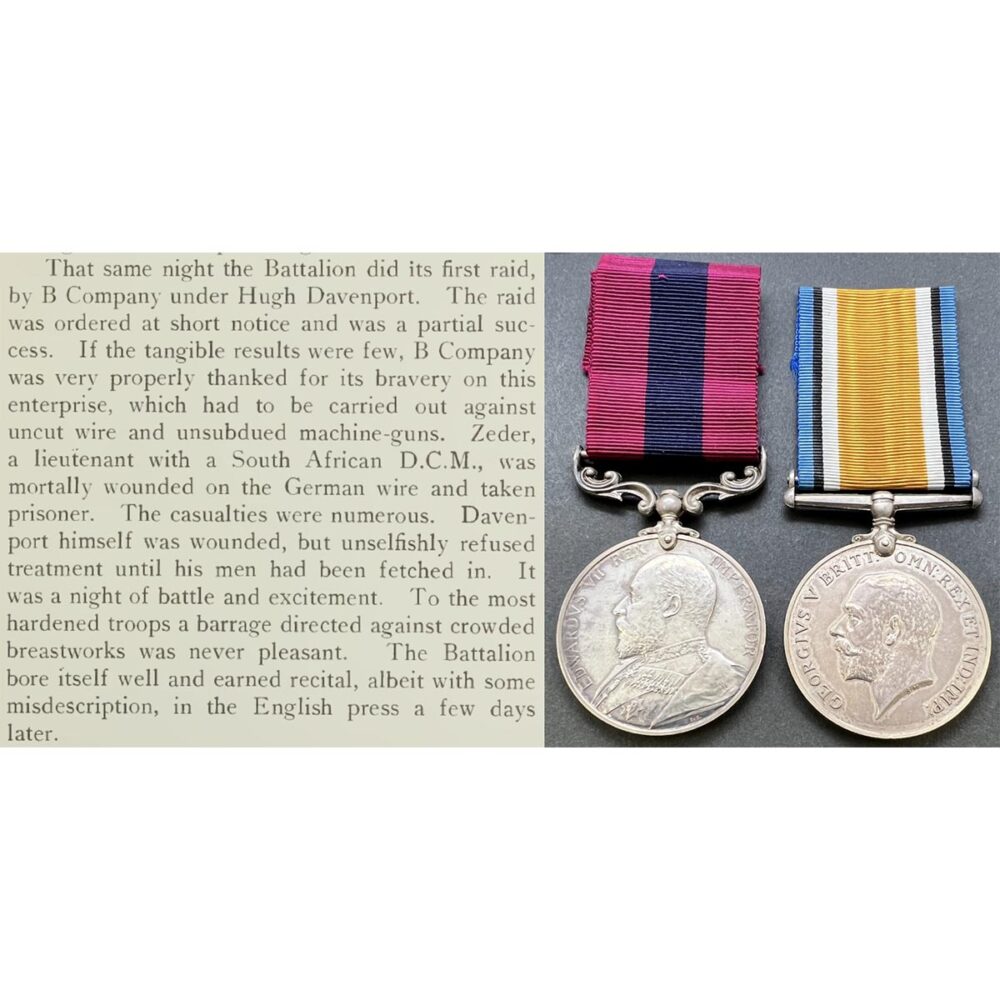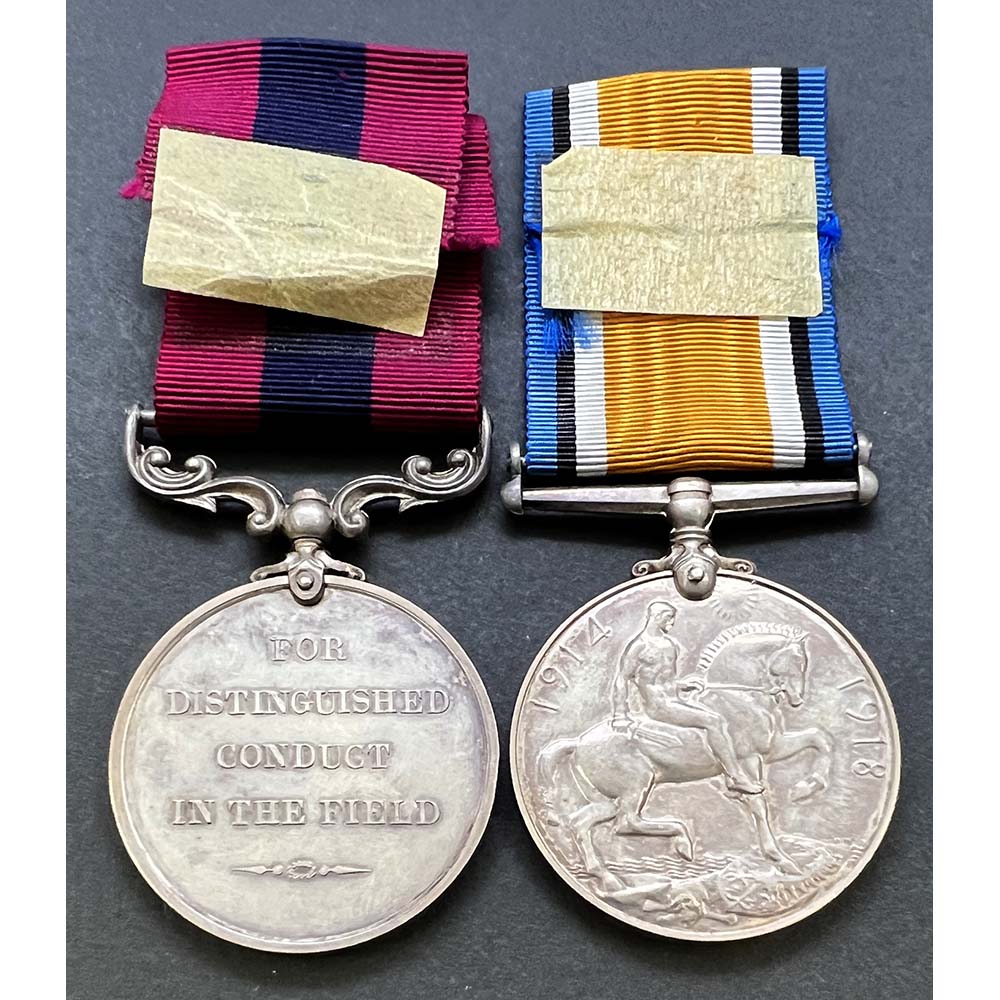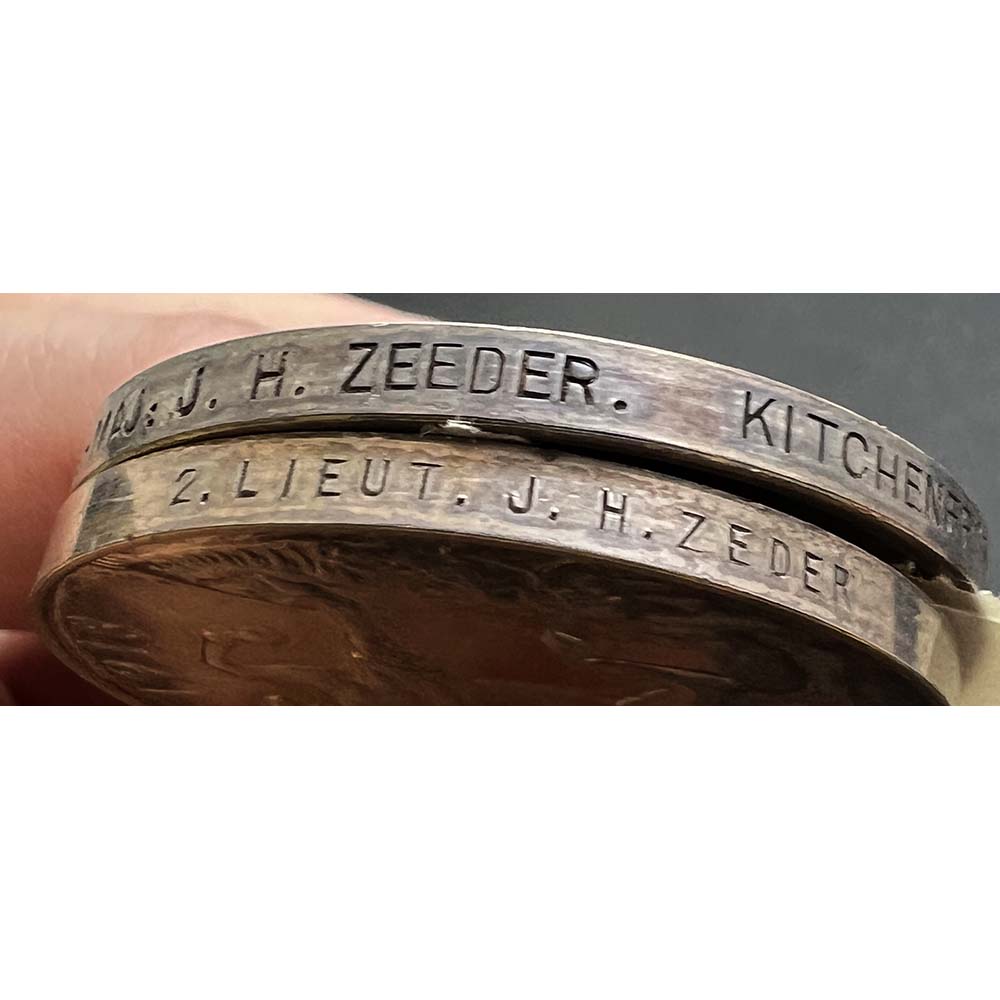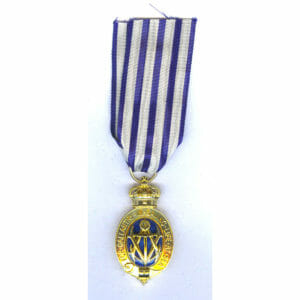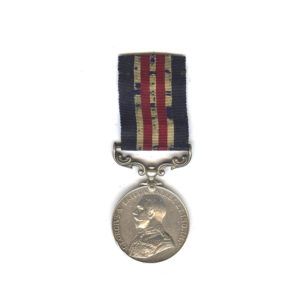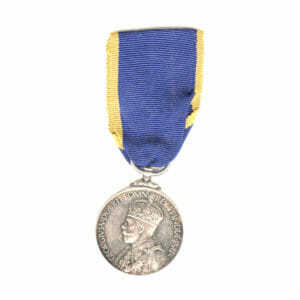Description
Boer War D.C.M. EDVII, WW1 BWM, Lieutenant Joseph Herbert Zeder, Cape Mounted Rifles, Kitchener’s Fighting Scouts, killed leading the first trench raid of the Oxfordshire and Buckinghamshire Regiment in WW1.
“2nd Lieut. Zeder, in charge of the left party, got up to the wire but could not get through, and this party suffered severely as they came back, 2nd Lieut. Zeder being killed” “Zeder a Lieutenant with a South African D.C.M. was mortally wounded on the German Wire and Taken Prisoner”.
1 of only 3 D.C.M.s earned by the Kitchener’s Fighting Scouts.
DCM Officially impressed: “Serjt:-Maj: J.H. Zeeder. Kitchener’s F.S.”
BWM Officialy impressed: “2. Lieut. J.H. Zeder”
Signed up and fought the Scouts as “Zeeder”, mentioned in the London Gazette as such.
Medals both unworn and about E.F., a minor edge bruise to the DCM.
DCM Announced London Gazette, 31st October 1902.
Also mentioned in Despatches as Regimental Sergeant Major on 3rd June 1902.
Provenance, Ex Christies July 1985.
Son of a German Immigrant in London and later Hotel Proprietor, Joseph Zeder fought in the Boer War first for 19 months with the Cape Mounted Rifles, until he was tried and sentenced by a Court Martial on 26th June 1901, to 42 days of hard labour and imprisonment, he was to be discharged as a man of “worthless character”.
Well after getting out of prison, he immediately signed up with the Kitchener’s Fighting Scouts, who had use for such men in the field, although he conveniently left off on his attestation form the reason he was in need of a new regiment.
He signed up on 29th August 1901, and flourished, becoming Sergeant Major, earning the Distinguished Conduct Medal, soon afterwards being commissioned as a Lieutenant in the 1st Kitchener’s Fighting Scouts.
He returned home to England and ran the Southdown Hotel in Eastbourne, Sussex by 1911.
With the new war against his father’s homeland, he attested for service and was commissioned as 2nd Lieutenant in the 4th Battalion Oxs and Bucks Light Infantry.
He joined the 2nd Battalion 4th Oxs & Bucks in France and led his Company in the Battalions First Trench Raid, they had only landed recently on 24th May 1916, and his death came on the 28th June 1916.
GK Rose recalls in “Story of the 2/4th Oxfordshire and Buckinghamshire Light Infantry:
“That same night the Battalion did its first raid, by B Company under Hugh Davenport.
The raid was ordered at short notice and was a partial success. If the tangible results were few, B Company was very properly thanked for its bravery and enterprise, which had to be carried out against uncut wire and un-subdued machine guns.
Zeder, a Lieutenant with a South African D.C.M. was mortally wounded on the German Wire and taken Prisoner.
Davenport himself was wounded but unselfishly refused treatment until his own men had been fetched in. It was a night of battle and excitement.”
“I recall especially the work of some who have not returned: Davenport, Scott, Stockton, Zeder, and Tiddy among the officers, and among the non-commissioned men a host of good comrades.”
At zero they all advanced, but the wire was insufficiently cut. Lieut, Stockton, with the right party, under very heavy fire cast both right and left about 50 yards to try to find a gap, but did not succeed in doing so, and brought the right party back.
2nd Lieut. Zeder, in charge of the left party, got up to the wire but could not get through, and this party suffered severely as they came back, 2nd Lieut. Zeder being killed.
The supporting party were also held up by uncut wire, and eventually returned to the trenches, having lost 8 killed and about 30 wounded, nearly all of whom were brought in. Sergeant Prentice, Corporal Brereton, and Private Gardner received the Military Medal for their actions during this raid, and the G.O.C. 61st Division wrote that he considered it had been carefully planned and gallantly carried out. The failure of the raid was due to the uncut wire.
War Diary of the Day:
28th June 1916:
“In Trenches and front posts… Lt KE Brown and 2nd Lt WH Moberly left our lines at about 1pm to make a reconnaisance of the enemys wire in view of a raid that evening.
Lt Brown successfully accomplished his task, returning about 5.3, Lt Moberly was wounded in the left shoulder by a sniper and managed tog et back to our trenches.
A Raid was carried out by B Company that night, Orders and Reports contained in Appendix I
Casualties, Missing and believed to be Killed, 2/Lt J.H. Zeder, wounded, Capt HN Davenport, Other ranks, 5 killed, 25 wounded.
A summary of his life in Little Chelsea at War reads:
“SECOND LIEUTENANT J H ZEDER
2nd Lieut J H Zeder, 2nd Battalion, Oxford Light Infantry. Killed in action on 3 July 1916, aged 39. Buried in Cabaret-Rouge British Cemetery, Souchez, France.
He previously fought in the Bechuanaland Expedition of 1986-97, the Boer War 1899-1902 where he was awarded the Distinguished Conduct Medal and the Natal Insurrection of 1906.”
JOSEPH’S LIFE AND HIS FATHER WHO RIPPED OFF THE GROSVENOR HOTEL
Joseph Herbert Zeder, was born in Kensington London, during 1877, being Half German and Half British.
His father was Joseph Hermann Zeder, who was born in Baden-Baden, Germany during 1841 to Joseph Zeder and Franziska De Morsche. Who had married Maria Louisa Strong, from Pewsey in Wiltshire during 1871.
Thing were looking up for the Zeder family in Kensington, as his father, previously a Hotel Waiter had been made Manager of a Hotel.
He would then become a hotel proprietor, which might have been too good to be true as the actual owner seems to have put Zeders name on the business to hide his own, later leading to a lengthy public court case, “THE GROSVENOR HOTEL CASE”.
“The manager of the company was then a name named Joseph Zeder, and he had received from this tradesmen a sum of about £1500 by way of present.
It the duty of Mr Zeder to sign the orders for grocery goods, and it was also his duty to check the accounts and see they were proper accounts for the directors to pay. There was an arranged all those years between Zeder and Batey that he should pay Zeder 5% upon the amount paid him for good supplied. It would, therefore, be of the interest of Zeder to give as many orders as he could and to make the accounts as high as possible, the result being that instead of 5% or more going into the coffers of the company, and thence into the shareholders pockets, Zeder himself received all the benefit…”
A young Joseph about 19 years old, got himself a British Passport on 1st July 1896 and set off for South Africa.
He seems to have fought in a number of successive wars before returning home.
In 1911 he was living in Eastbourne, Sussex, listed as a Hotel Proprietor of the Southdown Hotel.
